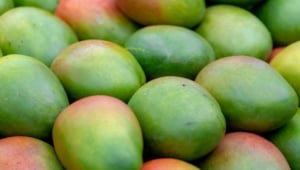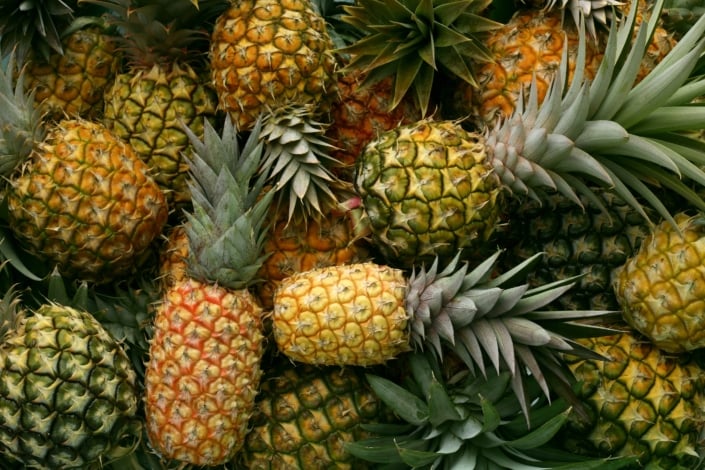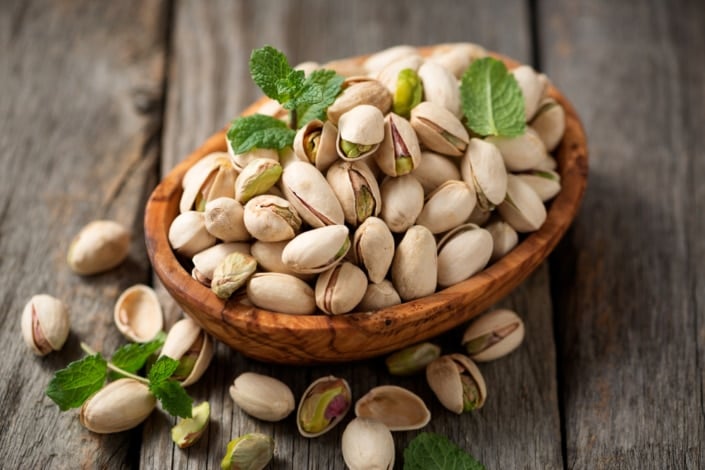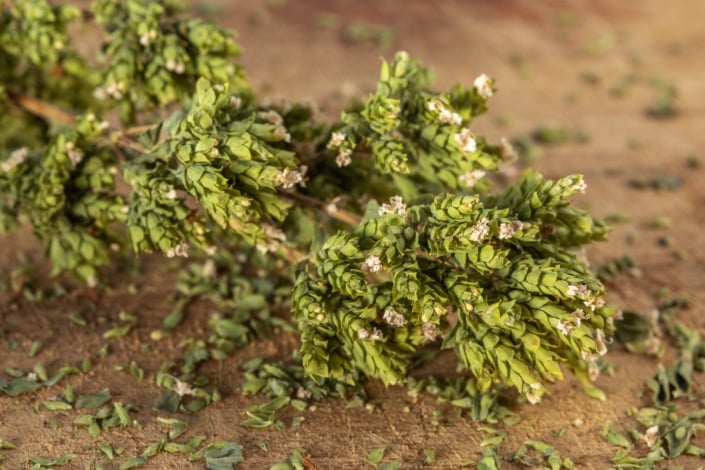10 Benefits of Mango and 2 Side Effects (+Nutrition Facts)

Mangoes are considered a true superfood for a reason. Not only do they have particularly tasty, sweet pulp, but they also have multiple benefits for your health. Do you know what latex and mangoes have in common? Read on to find out that, and more facts too.
Mangoes are very popular. Above all, they impress with their aromatic sweetness and versatility. Mangoes are suitable for salads, jams, and as a snack, among other things.
Interesting Facts on Mangoes

Interesting Facts on Mangoes: the Mango Tree
The mango (Mangifera indica) belongs to the subtropical stone fruit family and grows mainly in Asia, South America, and Africa, where it is even considered the king of fruits.
There are just ten countries in the world that produce more than 80 percent of the entire amount of mangoes harvested. These countries include India, Mexico, and Egypt.
The mango tree is evergreen, fast-growing, and can reach heights of over 35 meters. The trunk of the tree itself can grow over a meter thick, and even the crown of the tree can reach a diameter of 30 meters in some cases.
In general, the mango tree is particularly popular in subtropical regions. This is due to the fact that it can continue bearing fruit for more than 300 years, among other things.
Mangos in the Past
In as early as about 1,200 B.C., the mango was mentioned as the food of the gods in the Hindu Vedas. These are collections of religious texts of Hinduism, first passed down orally and later written down.
To this day, the mango represents attributes such as strength and longevity in Hinduism, so it is no coincidence that the mango is the national fruit of India.
The Mango’s Journey

Distribution of Mango
The mango arrived with Portuguese travelers on their way from India to Europe in as early as the 16th century. The first mention of the mango in a European language also dates back to this time. The mango was mentioned by name in the journal of an Italian traveler from 1510.
Nutrition Facts and Calories
Mangoes are not known as a superfood without reason and they contain a number of valuable ingredients.
You’ve certainly eaten a mango before and had the pleasure of indulging in its sweetness, but this delicious taste does not come about by chance. The flesh of the mango contains a relatively large amount of sugar, meaning it isn’t short on calories either. Nevertheless, mangoes are considered very healthy. Take a look at our overview table to find out more.
| Components | 100 grams of mango |
|---|---|
| Calories | 56 kcal |
| Water | 83 g |
| Fat | 0.4 g |
| Carbohydrates | 12.8 g |
| Protein | 0.8 g |
| Dietary fiber | 1.7 g |
| Potassium | 190 mg |
| Calcium | 10 mg |
| Magnesium | 18 mg |
| Iron | 1.2 g |
| Vitamin B1 | 0.05 g |
| Vitamin B2 | 50 μg |
| Niacin (vitamin B3) | 700 μg |
| Vitamin B6 | 130 μg |
| Vitamin C | 30 mg |
| Folic acid | 31 μg |
| Vitamin E | 1000 μg |
| Vitamin A | 194 μg |
For example, take a look at the amount of vitamin A in mango. Eating just 200 grams of the sweet fruit provides the daily amount of vitamin A an adult needs.
Health Benefits of Mango

Health Benefits of Mango
Not only can eating mangoes help you get your recommended daily amount of some nutrients, but the exotic superfruit has a positive effect on our health in general.
All we have to say is, it’s not only your eyes and intestines that can benefit from eating mango. The fruit is said to have anti-diabetic, anti-viral and anti-inflammatory properties. Read on to find out more about the benefits of eating mango.
Mango Benefits Your Immune System
We’ve all been there – winter arrives, you fall ill and then you look for ways to boost your immune system. How about some delicious mango? Not only does it taste good, but you’ll also do something for your immune system at the same time.
Vitamin A supports the production of antibodies and ensures that cell membranes remain intact. This is important for maintaining the barrier function of the mucosal cells in the gastrointestinal, respiratory and urinary tracts.
The vitamin C in mango supports your body’s immune system, along with vitamins A and E. In addition, vitamin E inhibits numerous processes that can cause inflammation.
Benefits of Mango Against Aging

Benefits of Mango Against Aging
In particular, the vitamins A, C and E contained in mango help neutralize free radicals in your body. Not only do these free radicals sound nasty, they are.
In fact, they cause disorders in cells and are associated with the aging process, so by eating mango, you’re actively helping to slow down your aging.
Mango Benefits Your Heart and Muscles
Potassium is also involved in important processes in your body and is abundant in mangoes. Among other things, potassium ensures the smooth transmission of electrical nerve impulses as well as balanced electrolyte levels.
A lack of potassium may cause your muscles and heart not to function properly and a pronounced potassium deficiency may eventually even lead to muscle weakness, cardiac arrhythmia, and paralysis.
Mango Benefits Your Skin

Mango Benefits Your Skin
This might surprise you, but mangoes actually make for beautiful skin. The fruit can enhance your skin’s appearance and work magic on your complexion.
The vitamin A in mangoes also has an anti-aging effect and the vitamin C the fruit contains stimulates the production of collagen, which, among other things, makes your skin smooth and supple.
Sexual Benefits of Mango
Eating mangoes for a better sex life? This may sound strange at first, but the vitamin E contained in mangoes can help regulate sex hormones and boost your libido. Try it out and opt for a mango lassi rather than a glass of wine on your next date night.
Mango Helps to Keep Gut Flora Healthy

Mango Helps to Keep Gut Flora Healthy
Dietary fiber and bioactive polyphenols in this superfruit help digestion and ensure balanced gut flora.
In a Texas study on people who suffered from chronic constipation, one group was given mangoes to eat. The other group took the same amount of fiber, but in powdered form.
In the group that consumed mangoes, not only did the frequency of their bowel movements improve, but also the stool consistency itself.
Regularly consuming mangoes may also prevent the loss of beneficial gut bacteria. Their relatively high fiber content also plays a part in this.
Mango Benefits Your Eyesight

Mango Benefits Your Eyesight
As we already mentioned, beta-carotene is a precursor to vitamin A and is abundant in mangoes. Your body then converts beta-carotene into vitamin A, which is important for your eyesight.
A vitamin A deficiency often first shows up as vision problems at dusk, or even as dry eyes or corneal inflammation. A lack of vitamin A can even lead to blindness in the worst-case scenario, mainly in children.
Here you can find out if spinach also has health benefits for your eyesight.
Benefits of Mango for Your Hair
You have probably already noticed the vast amount of haircare products that contain mango. The reason for this is that mango provides valuable nutrients that benefit your hair.
The pectin in mangoes promotes a healthy scalp and the vitamins it contains accelerate the growth of healthy, strong and shiny hair. Vitamin A repairs hair and protects it from UV rays, while vitamin C promotes the secretion of sebum, which is important for hair growth.
This vitamin also strengthens hair follicles, preventing the loss of new hair. If you want strong, long hair, mangoes are highly recommended.
Mango Benefits in Pregnancy

Mango Benefits in Pregnancy
Mangoes are especially beneficial for women during pregnancy. This is because this tropical fruit contains a lot of folic acid, in addition to magnesium, calcium, phosphorus and potassium.
These components are important in pregnancy and support your baby in its development.
It is also the ideal fruit to consume when breastfeeding as it helps to support your hard-working body with important nutrients.
Mango Benefits Your Memory
Mangoes can help your memory. Namely, the glutamic acid the fruit contains stimulates nerve cells and improves concentration.
Both have a positive effect on the cognitive processes in the body. Do you have an important exam coming up soon? Mangoes can support you during periods of increased brain activity and when your memory is particularly challenged.
Is Mango Good for You?

Is Mango Good for You?
To sum up, not only do mangoes provide valuable minerals and vitamins, but also secondary plant substances. The calcium, magnesium and potassium in mangoes are important for your entire body.
Among other things, they stimulate blood cell formation, facilitate the interaction between nerves and muscles, and boost your metabolism.
Mangiferin is also a secondary plant substance. It is found in the fruit, seeds, peel and core. Mangiferin helps fight off bacteria and viruses and also has an antioxidant effect. It is therefore considered a free radical scavenger.
Free radicals are metabolic intermediates, which are held responsible for the development of various diseases. If you eat mango regularly, the mangiferin the fruit contains will have an analgesic and anti-inflammatory effect.
In traditional medicine especially, this bioactive plant substance is used to treat all kinds of physical problems and diseases. These include diabetes, dementia, depression, allergies, cancer and cardiovascular problems, for example.
In conclusion, therefore, it can be said that mangoes are good for you and your health.
Is Mango Good for Weight Loss?

Is Mango Good for Weight Loss?
Mango is particularly good at making you feel full, so it is a popular fruit to eat if you want to lose weight. After eating mango, you won’t feel hungry for a long time and as a result, you’re less likely to be tempted to snack in between meals.
An important but: mango is considered very healthy, but at the same time, it contains a lot of fructose and sugar also means a lot of energy or in other words, calories. As such, if you are actively counting calories, this is something you should pay attention to.
Can Dogs Have Mangoes?

Can Dogs Have Mangoes?
As long as your dog does not suffer from diabetes, mangoes are safe and even healthy for dogs. Similar to humans, your dog will also benefit from the many vitamins the fruit contains.
A small dog weighing 21 to 30 lbs should eat no more than two to three pieces of mango.
If your dog weighs 31 to 50 lbs, they may eat five to six pieces of mango. Large to very large dogs that weigh more than 50 lbs can have a handful of mango pieces.
However, you shouldn’t give your dog too much mango to eat, because the fruit is still relatively high in sugar and the number of carbohydrates can lead to problems with obesity, diabetes, oral health, and stomach upsets.
Find out here whether dogs can have pistachios or not.
Side Effects of Mangoes
Mangoes are usually well tolerated even by individuals who are intolerant to citrus fruits, so these people can still reap the benefits of the high vitamin A and D content in mangoes for preventing colds.
So in general, mangoes are considered very easy to digest. Nevertheless, the consumption of mangoes can also lead to some unpleasant side effects. Below you can find out which symptoms you should watch out for.
Skin Rash from Mangoes

Side Effects of Mangoes
Ever heard of mango dermatitis? This rash often occurs in people who work in mango harvesting and production. This is because they come into contact with large amounts of the mango tree’s milky sap as well as the fruit’s peel.
Numbness in The Mouth and Itching Skin
It is extremely rare to have an allergy purely to mangoes. Nevertheless, it is not impossible. If your lips start to tingle or your skin starts to itch after eating mangoes, it may well be an allergy. In most cases, however, it is not an allergy to mangoes alone, but cross-reactivity.
This refers to an allergy that is triggered by substances originating from other plants, animals or pollen, for example. An allergy to mango is often triggered by a latex or mugwort allergy.
Preparation of Mango and Tips for Use

Preparation of Mango and Tips for Use
Mangoes can be used in many ways. However, there are a few points to consider, especially when buying and storing this sweet fruit. Read on to find out more.
Purchasing Tips: How to Find the Best Mango
When buying mangoes, make sure they are neither too soft nor too hard. Also, they should not give off an unpleasant odor. However, the fact that you can tell how ripe a mango is by the color of its peel is a common misconception.
You can tell that a mango is fully ripe if its skin is slightly shriveled and it smells sweet. Small black dots on the peel can also indicate that the mango is ripe and ready to enjoy.
How to Grow Mangoes
Perhaps you’re thinking that you can simply plant a mango seed so that sooner or later you’ll be able to grow and pick your very own mangoes? Unfortunately, it’s not quite that easy.
However, you can grow an exotic mango tree yourself with the help of what is known as the regrowing method.
The regrowing method is quite simple to implement. You’ll need to follow the steps below:
- Obtain the seed by carefully cutting open the mango husk.
- Lay the opened husk in a damp kitchen towel, then pack this into a freezer bag.
- Let the closed bag rest for ten days.
- If necessary, re-wet the kitchen towel several times.
- After that, you should start to see the seedling and small roots appear.
- You can now plant the seedling and watch it grow. The ideal location for your mango plant should be bright and warm.
How to Store Mangoes Properly

Storage and Preparation of Mangoes
In the fridge or in the fruit bowl?
To keep your mango fresh for as long as possible, store it at room temperature. Even though it will definitely stay fresh for a while, it’s still best to consume it within a few days.
Preparation Tips: How to Use Mangoes
Most people prefer to eat mangoes plain. However, they are also excellent for desserts – whether as part of a fruit salad or to give a fresh kick on a delicious cake.
How about, for example, a delicious smoothie with mango or an exotic mango jam? You can also make your own mango butter from the sweet fruit, or, if you like to keep it simple, you can also make juice.
Even savory dishes can be spiced up by the sweet taste of mango. For example, you can serve the popular mango chutney with fish and poultry or as a side to dishes with lamb or game.
Bitter vegetables such as chicory and radicchio can be made more digestible and sweeter with mango.
To round things off, here are two interesting facts about mangoes. You can share these with your friends when you next meet them, for example.
Fact 1: there are more than an incredible 1,000 different varieties of mango worldwide. Not only do they differ in terms of color and taste, but the area of cultivation and even consistency of the flesh can also vary depending on the type of mango. In Europe, for example, mangoes with low-fiber pulp are preferred because they are usually easier to process.
Fact 2: Oil can be extracted from the mango seed to make mango seed oil. The rather viscous oil is similar in consistency to cocoa butter. Mango seed oil is therefore used in chocolate, margarine, and various desserts. The cosmetics and pharmaceutical industries know about the advantages of mango seed oil too.





